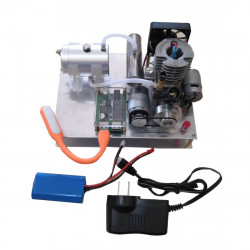
What's the difference between Gas and Electric RC planes?
Gas Engines vs Electric Engines for RC Planes
Power Differences
- Gas Engines:
- Increase the horsepower and the speed.
- Capable of powering larger RC models.
- They need more adjustment, though, and are noisier.
- Electric Engines:
- They are perfect for indoor or mini RC models because they are smaller and quieter.
- It is easier to manage, particularly for novices.
Because they provide raw power, gas engines are appropriate for larger, heavier RC models with higher engine demands. Electric engines, on the other hand, provide quieter, more sophisticated performance, making them ideal for smaller or more accurate RC models. Electric engines are frequently a better option if you're a novice or looking for something more straightforward to manage.
Fuel Differences
- Gas Engines:
- Function similarly to lawnmowers or tiny vehicles, using a mixture of gasoline and oil.
- Need frequent fuel purchases yet require speedy refueling.
- Electric Engines:
- Use rechargeable batteries, usually made of nickel or lithium polymer (LiPo). Batteries are reusable, although they require 30 minutes to several hours to recharge fully.
Gas engines require frequent fuel purchases even though they can be refueled very instantly. Conversely, electric engines use rechargeable batteries, which require time to recharge but have a long cycle life. Because of this trade-off, you will have to choose between the continuous expense of fuel and the battery recharging downtime.
Which Is Safer: Gas or Electric Engines?
- Electric Engines:
- Because there are no combustible fuels present, it is thought to be safer.
- Reduced mechanical failure risk due to fewer moving parts.
- Gas Engines:
- include working with flammable gasoline, which raises the possibility of mishaps.
- Need to be carefully maintained in order to prevent malfunctions.
Electric engines are the best option for enthusiasts who are concerned about safety. Accident risks are greatly decreased since gasoline is not needed to handle the combustion process. Despite their power, gas engines have inherent safety risks because of combustion, mechanical problems, and fuel handling.
Environmental Impact
- Electric Engines:
- During operation, emit no emissions.
- An improved option for enthusiasts who care about the environment.
- Gas Engines:
- Burn gasoline, which deteriorates the environment and pollutes the air.
Electric engines are the obvious choice if you care about sustainability. Because they don't use fossil fuels, they don't emit any emissions while in flight, which is good for the environment. On the other side, gas engines emit pollution and burn fuel, which may worry you if you care about the environment.
Operational Difficulty
- Gas Engines:
- It is more difficult to run since engine tuning and maintenance are more complicated.
- Demand more excellent skill and careful handling.
- Electric Engines:
- It is much more straightforward to use, particularly for novices.
- They typically require little setup and arrive ready-to-fly (RTF).
Gas-powered RC planes are more difficult to operate, requiring precise control during flight, fuel management, and engine tuning expertise. In contrast, electric RC planes are easier to use and more forgiving. An electric engine is a better choice if you're a novice or want a hassle-free experience.
Should I Use a Simulator for Gas-Powered Planes?
Using a flight simulator prior to operating a gas-powered remote control aircraft is strongly advised. Learn the controls, hone your handling abilities, and get ready for real-world situations that could otherwise lead to costly wrecks with the help of simulators. Using a simulator before you really take to the skies might help you avoid costly mistakes and increase your confidence because gas-powered planes are more complicated and expensive.
Which RC Planes Are Better for Beginners?
- Electric Planes:
- It is less complicated to run and easier to maintain.
- Overall, less expensive to operate and maintain, ideal for learning the fundamentals.
Electric RC planes are by far the superior choice for people who are new to the game. Because of the straightforward controls, low maintenance requirements, and lower operating expenses, beginners may concentrate on learning the basics without having to worry about complex engine management or expensive repairs.
Cost Comparison: Gas vs Electric
Ongoing Expenses: Fuel vs Battery Replacement
- Fuel Costs (Gas Engines):
- Constant refueling is necessary for gas-powered aircraft, which can mount up.
- Depending on the fuel type and how frequently you fly, costs range from $10 to $30 or more every day.
- Battery Costs (Electric Engines):
- Rechargeable batteries such as LiPo or nickel-based (NiMH) cells are used in electric aircraft.
- Batteries are cost-effective over time because they can be recharged and reused, even though they eventually wear out.
Because fuel prices rise quickly, running a gas-powered aircraft can be expensive over time. However, because rechargeable batteries endure for many flights, electric planes have fewer ongoing costs. Long-term operating costs for an electric plane are often lower, even though batteries may need to be changed after prolonged operation.
Long-Term Maintenance Costs: Gas Engine Repairs vs Electric Upkeep
- Gas Engines:
- Mechanical failure is more likely when there are more moving parts.
- Maintenance expenses may increase as a result of engine rebuilds, tuning, and part replacements.
- Electric Engines:
- a Less complicated design with fewer potential problems.
- The only maintenance is the occasional motor service and battery replacement.
Because of their complexity, gas engines usually require more expensive long-term maintenance.









